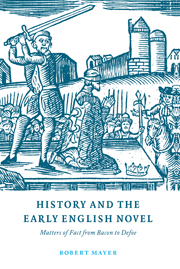Book contents
- Frontmatter
- Contents
- List of illustrations
- Acknowledgments
- Introduction
- 1 Baconian historiography: the contours of historical discourse in seventeenth-century England
- 2 “Idle Trash” or “Reliques of Somthing True”?: the fate of Brut and Arthur and the power of tradition
- 3 The History of Myddle: memory, history, and power
- 4 Lifewriting and historiography, fiction and fact: Baxter, Clarendon, and Hutchinson on the English Civil War
- 5 The secret history of the last Stuart kings
- 6 “Knowing strange things”: historical discourse in the century before Robinson Crusoe
- 7 “History” before Defoe: Nashe, Deloney, Behn, Manley
- 8 Defoe's historical practice: from “The Ages Humble Servant” to Major Alexander Ramkins
- 9 “Facts that are form'd to touch the mind”: Defoe's narratives as forms of historical discourse
- 10 From history to the novel: the reception of Defoe
- Conclusion
- Index
- CAMBRIDGE STUDIES IN EIGHTEENTH-CENTURY ENGLISH LITERATURE AND THOUGHT
4 - Lifewriting and historiography, fiction and fact: Baxter, Clarendon, and Hutchinson on the English Civil War
Published online by Cambridge University Press: 31 October 2009
- Frontmatter
- Contents
- List of illustrations
- Acknowledgments
- Introduction
- 1 Baconian historiography: the contours of historical discourse in seventeenth-century England
- 2 “Idle Trash” or “Reliques of Somthing True”?: the fate of Brut and Arthur and the power of tradition
- 3 The History of Myddle: memory, history, and power
- 4 Lifewriting and historiography, fiction and fact: Baxter, Clarendon, and Hutchinson on the English Civil War
- 5 The secret history of the last Stuart kings
- 6 “Knowing strange things”: historical discourse in the century before Robinson Crusoe
- 7 “History” before Defoe: Nashe, Deloney, Behn, Manley
- 8 Defoe's historical practice: from “The Ages Humble Servant” to Major Alexander Ramkins
- 9 “Facts that are form'd to touch the mind”: Defoe's narratives as forms of historical discourse
- 10 From history to the novel: the reception of Defoe
- Conclusion
- Index
- CAMBRIDGE STUDIES IN EIGHTEENTH-CENTURY ENGLISH LITERATURE AND THOUGHT
Summary
The editors of the Norton Anthology of English Literature assert that Clarendon's History of the Rebellion
was remarkable not only for the largeness of its canvas but for the force and coherence of the social philosophy informing it – which, under the name of Toryism, retains an influence even to the present day. As an historical rhetorician and portrait painter, Clarendon ranks with … Thucydides and Tacitus.
High praise indeed, but also equivocal praise. Clarendon, it seems, like Shakespeare in Johnson's famous “Preface,” deserves to be classed with the ancients, but he merits this honor because of the breadth of his vision, his rhetorical skills, and his character studies; he is praised more for his rhetoric than for his contribution to the historical literature on the Civil War. This ambiguous praise is wholly in keeping with the treatment of Clarendon in twentieth-century scholarship on historiography, since aside from rather formulaic praise for his character sketches, he is largely ignored in the history of history.
The eighteenth century, of course, did not ignore Clarendon; the History of the Rebellion was an immediate “bestseller,” and although some condemned it as fatally flawed by partiality, “it was widely recognized as a masterpiece.” The twentieth century, however, has been more dubious. John Kenyon declines even to regard Clarendon's History as “the real thing”: declines, that is, to consider the best-known historical work published in England in the century before the appearance of Robinson Crusoe as a genuine work of history.
- Type
- Chapter
- Information
- History and the Early English NovelMatters of Fact from Bacon to Defoe, pp. 75 - 93Publisher: Cambridge University PressPrint publication year: 1997

